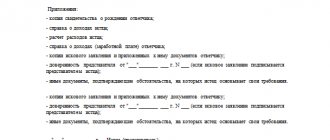Going to court requires compliance with the rules for drawing up and filing a statement of claim, including the formation of an annex to the claim. The Code of Civil Procedure of the Russian Federation is devoted to the documents attached to the claim in a separate article (Article 132 of the Code of Civil Procedure of the Russian Federation). It seems that everything is simple: if the plaintiff (the person who applied to the court) is waiting for the court to accept this claim, then he must turn to Article 132 of the Code of Civil Procedure of the Russian Federation and fulfill the requirements on the list. However, in reality, the essence of the dispute predetermines the need to carefully collect documents that will become an appendix to the claim.
Documents required for debt collection
On April 18, our regular author, candidate of legal sciences and adviser to the ALTHAUS Group on civil and housing legislation, Susana Kirakosyan, shared the intricacies of successful judicial debt collection for housing and communal services at an online seminar. Today you will learn what documents the management company or homeowners association must attach to the claim for debt collection and how to properly certify such documents.
In order for the management organization or homeowners association to prove the grounds for debt collection and its size, they will have to work hard and collect an impressive package of documents. Those who have already encountered a similar situation know that a one-page application for a court order will not be enough. Let's consider a complete list of documents that relate to debt. If you submit such a package to the court, no questions will arise:
1. Constituent documents of the claimant.
These include the charter of the management organization or HOA, the protocol on the election of the director of the management organization or the chairman of the HOA, and the OGRN certificate. Susana Kirakosyan also recommends attaching a recent extract from the Unified State Register of Legal Entities, which will confirm the authority of the manager.
2. Documents confirming the right to collect debt for housing and communal services.
Provide the court with a document confirming the debtor's ownership of the premises, minutes of the general meeting of owners on the choice of method of managing the apartment building. The management authority also encloses the management agreement and a copy of the license with the claim.
As additional evidence, you can take a screenshot of the list of licensee’s houses in the Housing and Communal Services GIS; it will help confirm that you manage the house. Certificates of services provided or work performed will be proof that you provide services and perform work of proper quality.
In addition, if the management agreement may provide for a procedure for resolving disputes regarding payment of debt for housing and communal services, provide claim correspondence with the debtor.
3. Documents confirming the amount of debt.
This may be a separate document or a calculation of the amount of debt for a certain period included in the application.
4. Documents confirming the good faith of the claimant.
Methods of working with debtors for housing and communal services
664545
Attachments to statements of claim of various categories of cases
Depending on the category of the case, the law may impose special requirements for attachments to the claim. Thus, in consumer protection cases it is often necessary to attach a claim. A sample of its preparation is posted on our website, and its copy and proof of delivery as an attachment to the claim will allow you to demand payment of a fine (for more details, see the statement of claim for the protection of consumer rights).
There are specifics when preparing applications for labor claims, administrative claims, and applications for special proceedings.
An approximate list of appendices to the claim can be found by identifying the subject of the claim and referring to the posted information about claims of the required category of cases; general information about the rules for filing a claim is also posted.
Regulatory legal acts governing the certification of documents
A package of documents necessary for debt collection has been collected. Now they need to be reassured. Requirements for the certification procedure are specified in:
- GOST R 7.0.8-2013, which establishes terms and definitions of basic concepts in the field of office management and archival affairs;
- GOST R 7.0.97-2016, which determines the composition of document details and the rules for their execution. The document will come into force on July 1, 2018; before that, GOST R 6.30-2003 is in force;
- Decree of the Presidium of the USSR Armed Forces dated August 4, 1983 No. 9779-X, which presents the procedure for issuing and examining copies of documents relating to the rights of citizens by enterprises, institutions and organizations.
In addition, the management organization or HOA may have its own procedure for certification of documents, set out in a local act - instructions, regulations or regulations on office work.
How to register partial repayment of debt for housing and communal services
70741
How to properly file a claim in a court of general jurisdiction under the new rules
From October 1, 2021, the procedure for filing a statement of claim (filing a claim) in a court of general jurisdiction has changed significantly. It must be said that the order that has been in force since 1964 has changed (see Article 127 of the Code of Civil Procedure of the RSFSR). Cassation courts of general jurisdiction have appeared as a cassation instance, it is mandatory to maintain an audio record, the deadline for eliminating the shortcomings of the OBD has been linked to the date of sending a copy of the ruling to the plaintiff, the right to file a private complaint against the OBD under Article 136 of the Code of Civil Procedure of the Russian Federation has been abolished, there is no longer jurisdiction over cases, there is only jurisdiction , And much more. There were some blunders, for example, Article 150 of the Code of Civil Procedure of the Russian Federation contained the obligation of the judge, when preparing the case for trial, to send the defendant a copy of the claim by December 2, 2019. No, this is not a transition period, this is the sloppiness of the legislator. And the judges were most indignant, since this was “their” article. And the norm of Article 113 to this day contains an order to send copies of procedural documents, fortunately it is not specified which ones (an open list) and no conflict arises.
So what do you need?
Firstly, it is necessary to correctly determine the jurisdiction of the dispute. Tribal and territorial. If a dispute arose between citizens or between a citizen and an organization, between a citizen and an authority in a private law dispute, then you should go to a court of general jurisdiction. If the case is related to state secrets, then at first instance it will be considered by the regional court and its equal (territorial, supreme court of the republic, Moscow City Court). In other cases - a district court or a magistrate. The magistrate has jurisdiction over civil cases where the value of the claim does not exceed 50,000 rubles, for the protection of consumer rights - not exceeding 100,000 rubles, as well as writ proceedings not exceeding 500,000 rubles. Next step. There are jurisdictions according to the general rule, alternative, and exclusive. There is also contractual jurisdiction and an arbitration clause; we will not touch on them - this only applies to complex contracts. If a dispute about the right to things (objects) inextricably linked with land or subsoil, then it will be considered by the court at the location of such thing (object), the claim against the carrier is brought at the location of the carrier to whom the claim was made, the claim of the testator - at place of opening of inheritance; all this is called exclusive jurisdiction. If a dispute is about the protection of consumer rights, a labor dispute about the restoration of the rights of an employee, about the collection of alimony (applies only to the recipient of alimony, the alimony payer files a claim to change the amount of alimony as a general rule!), about divorce in the presence of minor children, about compensation for harm to health or as a result of the loss of a breadwinner, for the protection of the subject of personal data, then the claim can be brought at the place of residence of the plaintiff, that is, according to the rules of alternative jurisdiction. You can also bring a claim according to the rules of optional jurisdiction, for example, a claim against a branch of an organization at the location of the branch, a claim arising from a contract at the place of execution of the contract. In other cases, the general rule applies. The claim is brought at the location of the defendant. For individuals this is the registered address at the place of residence, for legal entities - the legal address.
Next in the statement of claim we indicate the plaintiff: full name, address. If you plan to win a court case and receive a writ of execution, then immediately indicate your date and place of birth, as well as your Taxpayer Identification Number (TIN) or SNILS. This is a little life hack! If the claim is signed or filed by a representative, then indicate the name of the representative. It is necessary. A common mistake. Next, we indicate the defendant: full name or name, address. If we know the date and place of birth, series and number of the passport, INN, OGRN, KPP, date of registration as a legal entity, then we also indicate it. Called "respondent identifiers". If third parties are involved in the case, we also indicate them.
Following. We indicate the price of the claim in rubles. It is not forbidden to indicate there the amount of the state duty that you paid. But this is not necessary; there is no regulatory requirement.
Next is the heading “Statement of Claim” and what it is about: about the collection of alimony for the maintenance of disabled parents, about the recovery of unjust enrichment, about eviction without the provision of other living quarters, about the recovery of recourse, about the restoration of the employee’s labor rights, and so on. It is advisable to adhere to the classifier of forensic statistics, but this is rather a requirement of business ethics.
Next, you state the essence of the problem (the basis for the claim), indicate what you are willing to use to support (evidence), the claims (the subject of the claim). Sign and date. The dating of the statement of claim is not provided for by the Code of Civil Procedure of the Russian Federation, but for the absence of a signature, Article 135 of the Code of Civil Procedure of the Russian Federation is punishable. The application will be returned.
Next, we attach to the application a receipt for payment of the state duty, a power of attorney or warrant from the representative, documents confirming the sending to the defendant and other persons participating in the case, copies of the claim and attachments that they do not have, written evidence, information about the pre-trial settlement of the dispute.
The receipt for payment of the state fee is attached in the original. If the payment was made electronically, then you must print and certify the receipt. If it is impossible to certify (Tinkoff, Tochka and other banks without client offices), then difficulties may arise. If the statement of claim is submitted by filling out a specialized form, or, more simply put, via the Internet, then we attach a copy of the receipt in electronic form, and present the original in the original at the first court hearing. Otherwise - leaving without consideration, Article 222 of the Code of Civil Procedure of the Russian Federation.
The legislator has not resolved the issue of properly sending copies of the claim. I published a note about this in the magazine “Russian Justice” and in one legal social network. I recommend doing this in a valuable letter with a list of attachments. Moreover, indicate the name and address of the recipient in the inventory. Otherwise, you can waste a lot of time proving that you are right.
As for written evidence, I recommend checking the copies in accordance with GOST R 7.0.97-2016. The same applies to documents confirming expenses for legal services. Which, according to Article 100 of the Code of Civil Procedure of the Russian Federation, are recovered from the “losing” party in favor of the “winner”. The original receipt or check must be attached to the case, but a copy of the agreement will suffice.
General procedure for certification of documents
Let's start by defining the concept of a certified copy of a document. This is a copy on which, in accordance with the established procedure, the details that ensure its legal significance are indicated.
The certified copy must contain:
- inscriptions “Correct”, “Copy is correct”;
- the position of the person who certified the copy or information about his representative by proxy;
- personal signature of the witness or his representative;
- full name;
- date of certification.
Susana Kirakosyan does not recommend using an electronic signature or facsimile to certify debt documents - the court may have doubts that they were delivered by the right person. But this option is possible.
Instructions: how to collect debt for housing and communal services when inheriting an apartment
323272
Main documents that are appendices to the claim
An attachment to the claim will almost always be a receipt for payment of the state duty - only the original, payment must be made on behalf of the plaintiff and depending on the price of the claim.
Almost always, the appendix is primary documents, i.e. documents on which the claim is based - contracts, receipts, acts, etc. They can be presented in copies, but the originals must be provided at the court hearing. If the originals are not kept by a party to the case, read the section “requests for evidence.”
If the plaintiff's claim is monetary, an appendix to the claim is a calculation of the cost of the claim. It must be drawn up with reference to the law (codes or agreement), calculated for a specific date, and signed by the plaintiff.
A copy of it is attached to the claim for delivery to the defendant; if there are third parties, a copy for them. Copies of documents that are annexed to the claim are also provided for other participants when such documents are not available (except for a receipt for state fees).
Certification of electronic and fax documents
If you decide to attach to the case a screenshot from the GIS Housing and Communal Services, confirming the information that you manage an apartment building, such a screenshot should be printed and the signature of the certifier should be placed on it. You can also make a printout of correspondence with the debtor via email.
Only an electronic document certified by an authorized person will have evidentiary force (Resolution of the Plenum of the Supreme Arbitration Court of the Russian Federation dated February 17, 2011 No. 12).
A document submitted to the court by fax is not considered indisputable evidence. This is only a copy of the document transmitted via communication. The authenticity of the fax document can be confirmed by the fax transmission report output by the sender's machine.
If a document has several pages, it can be certified in two ways:
- on every page;
- stitch the document, number the pages and put the number of pages, date and signature on the back of the last page, in the place where the stitching is done.
Collection of judicial penalties: judicial practice
39880
How to draw up a statement of claim in court - jurisdiction
It is difficult to find a person who has not had to be a plaintiff, defendant, or at least an indirect participant in justice. If you haven't had this experience yet, it's probably only a matter of time.








